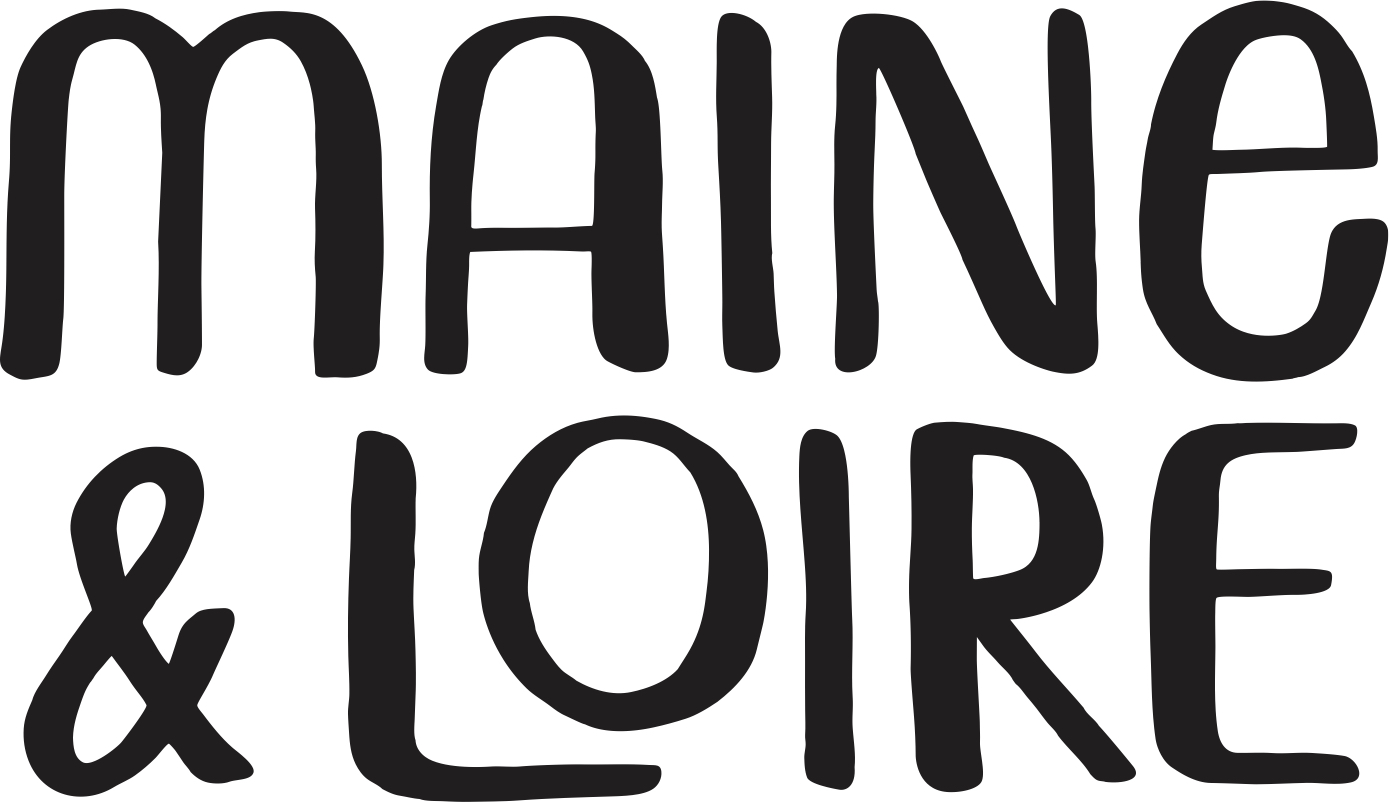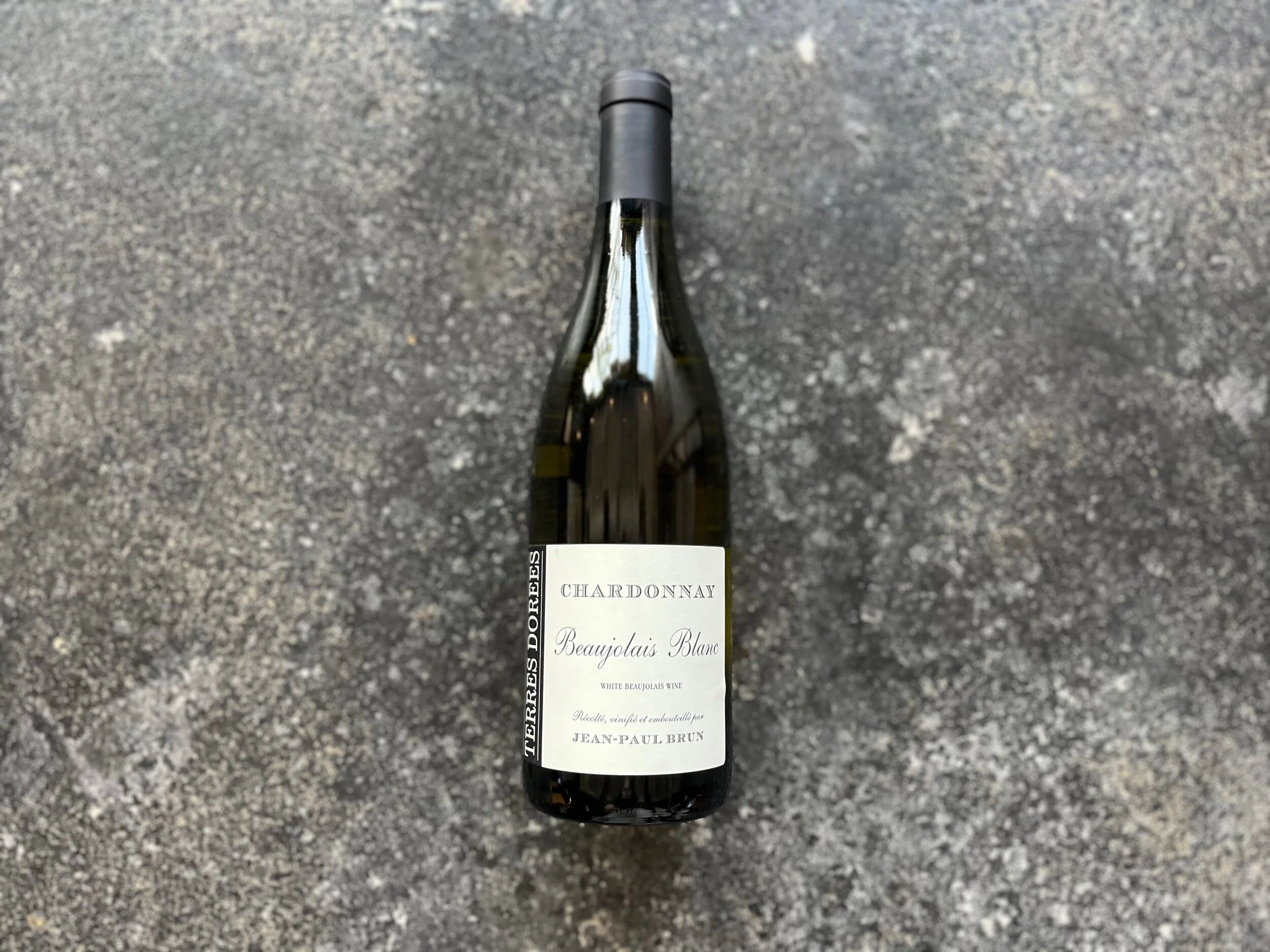Domaine des Terres Dorées Beaujolais Blanc 2023
Location: France, Beaujolais
Winemaker: Jean-Paul Brun
Grapes: Chardonnay
Soil: clay limestone
Winemaking: A pied de cuve is harvested early to kick start fermentation. Direct press, fermented and aged on the lees in concrete tanks with regular bâtonnages.
Beaujolais Blanc: Generous and clean with notes of unripe banana, fresh-cut grass, spring water and baking spices.
From the importer Louis/Dressner: Jean Paul Brun is located in Charnay, a village in the Southern Beaujolais just north of Lyon, in a beautiful area known as the ‘Terres Dorées’ or Region of Golden Stones. Brun is the owner and winemaker at this 60+ hectare family estate and has attracted the attention of the French and American press for the wonderfully fruity and delicate wines he produces.
Brun wants to make ‘old-style’ Beaujolais and his vinification differs from the prevailing practices in the region. He believes that the charm of Gamay's fruit is best expressed by the grapes' indigenous yeasts, rather than by adding industrial yeast. Virtually all Beaujolais is now made by adding a particular yeast during fermentation. Known as 71B, this yeast is a laboratory product made in Holland from a tomato base, which imparts wines with banana and candy aromas. It produces a beverage, but with no authenticity and little charm. Brun, on the other hand, wants to make a pure Gamay wine.
Brun's view is that Beaujolais drinks best at a lower degree of alcohol and that there is no need to systematically add sugar to the must (chaptalize) to reach alcohol levels of 12 to 13 degrees. His Beaujolais is made to be pleasurable - light, fruity and delicious - not an artificially inflated wine that shines at tasting competitions.
Only a minimal amount of S02 is used at bottling to keep the wine fresh and ‘headache-free’. Fermentation naturally produces a lot of CO2, which acts as protection against oxidation during aging; leaving some in the wine at bottling time also helps to keep it fresh. Filtration is also minimal so that the wine keeps its original fruit and aromas. Brun’s wines are not ‘blockbusters’ in the sense of ‘big.’ The emphasis is not on weight, but on fruit: Beaujolais as it once was and as it should be.
Location: France, Beaujolais
Winemaker: Jean-Paul Brun
Grapes: Chardonnay
Soil: clay limestone
Winemaking: A pied de cuve is harvested early to kick start fermentation. Direct press, fermented and aged on the lees in concrete tanks with regular bâtonnages.
Beaujolais Blanc: Generous and clean with notes of unripe banana, fresh-cut grass, spring water and baking spices.
From the importer Louis/Dressner: Jean Paul Brun is located in Charnay, a village in the Southern Beaujolais just north of Lyon, in a beautiful area known as the ‘Terres Dorées’ or Region of Golden Stones. Brun is the owner and winemaker at this 60+ hectare family estate and has attracted the attention of the French and American press for the wonderfully fruity and delicate wines he produces.
Brun wants to make ‘old-style’ Beaujolais and his vinification differs from the prevailing practices in the region. He believes that the charm of Gamay's fruit is best expressed by the grapes' indigenous yeasts, rather than by adding industrial yeast. Virtually all Beaujolais is now made by adding a particular yeast during fermentation. Known as 71B, this yeast is a laboratory product made in Holland from a tomato base, which imparts wines with banana and candy aromas. It produces a beverage, but with no authenticity and little charm. Brun, on the other hand, wants to make a pure Gamay wine.
Brun's view is that Beaujolais drinks best at a lower degree of alcohol and that there is no need to systematically add sugar to the must (chaptalize) to reach alcohol levels of 12 to 13 degrees. His Beaujolais is made to be pleasurable - light, fruity and delicious - not an artificially inflated wine that shines at tasting competitions.
Only a minimal amount of S02 is used at bottling to keep the wine fresh and ‘headache-free’. Fermentation naturally produces a lot of CO2, which acts as protection against oxidation during aging; leaving some in the wine at bottling time also helps to keep it fresh. Filtration is also minimal so that the wine keeps its original fruit and aromas. Brun’s wines are not ‘blockbusters’ in the sense of ‘big.’ The emphasis is not on weight, but on fruit: Beaujolais as it once was and as it should be.
Location: France, Beaujolais
Winemaker: Jean-Paul Brun
Grapes: Chardonnay
Soil: clay limestone
Winemaking: A pied de cuve is harvested early to kick start fermentation. Direct press, fermented and aged on the lees in concrete tanks with regular bâtonnages.
Beaujolais Blanc: Generous and clean with notes of unripe banana, fresh-cut grass, spring water and baking spices.
From the importer Louis/Dressner: Jean Paul Brun is located in Charnay, a village in the Southern Beaujolais just north of Lyon, in a beautiful area known as the ‘Terres Dorées’ or Region of Golden Stones. Brun is the owner and winemaker at this 60+ hectare family estate and has attracted the attention of the French and American press for the wonderfully fruity and delicate wines he produces.
Brun wants to make ‘old-style’ Beaujolais and his vinification differs from the prevailing practices in the region. He believes that the charm of Gamay's fruit is best expressed by the grapes' indigenous yeasts, rather than by adding industrial yeast. Virtually all Beaujolais is now made by adding a particular yeast during fermentation. Known as 71B, this yeast is a laboratory product made in Holland from a tomato base, which imparts wines with banana and candy aromas. It produces a beverage, but with no authenticity and little charm. Brun, on the other hand, wants to make a pure Gamay wine.
Brun's view is that Beaujolais drinks best at a lower degree of alcohol and that there is no need to systematically add sugar to the must (chaptalize) to reach alcohol levels of 12 to 13 degrees. His Beaujolais is made to be pleasurable - light, fruity and delicious - not an artificially inflated wine that shines at tasting competitions.
Only a minimal amount of S02 is used at bottling to keep the wine fresh and ‘headache-free’. Fermentation naturally produces a lot of CO2, which acts as protection against oxidation during aging; leaving some in the wine at bottling time also helps to keep it fresh. Filtration is also minimal so that the wine keeps its original fruit and aromas. Brun’s wines are not ‘blockbusters’ in the sense of ‘big.’ The emphasis is not on weight, but on fruit: Beaujolais as it once was and as it should be.

